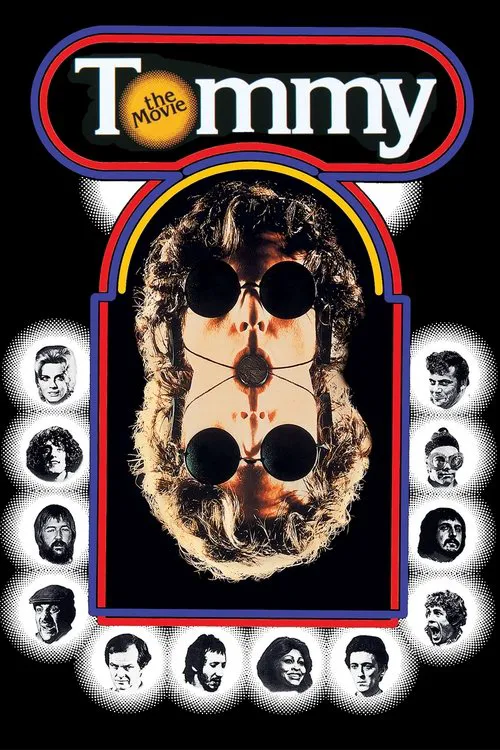Tommy

Plot
In the 1975 film 'Tommy', directed by Ken Russell and based on the rock opera of the same name by the Who, Peter Townshend crafts a semi-autobiographical story that explores themes of trauma, violence, and the consequences of societal neglect. The film is a visual interpretation of the original rock opera, weaving a fantastical narrative that combines elements of Greek mythology with the tumultuous life of Tommy Walker, a young boy left traumatized by a series of disturbing events in his early childhood. The film opens with a montage of graphic violence and war footage, highlighting the devastating effects of conflict on innocent civilians. It is within this environment that Tommy, a beautiful, blond-haired child, witnesses his father being brutally killed by a gang of marauders. The trauma of this event sets Tommy on a path toward emotional numbness, leaving him deaf, dumb, and blind. The narrative then shifts forward in time, where we find Tommy, now a young adult, in the care of his strict, unloving Uncle Ernie, a member of a cult-like organization known as the Deaf, Dumb, and Blind Boys of England. Ernie exploits Tommy's unique gifts as a pinball player, who through psychosomatic connections, possesses an incredible talent for the game. As Tommy's skills improve, so too does his reputation, attracting a devoted following of fans who, much like the devoted followers of a cult leader, begin to revere him as their messiah. The film's narrative is structured as a dreamlike odyssey, drawing on the imagery of the original rock opera. It is as if the film itself is experiencing the trauma that Tommy has endured, creating a shared, collective understanding between the viewer and the protagonist. Townshend's masterful storytelling blends fantasy and reality, blurring the lines between the actual events of Tommy's life and the elaborate, surreal sequences that illustrate his emotional state. One of the most striking elements of the film is its use of visual motifs. Russell employs an array of vivid imagery to convey the emotional intensity of Tommy's experiences, from the haunting images of the battlefield, where Tommy's father was killed, to the elaborate, hellish landscapes that symbolize Tommy's inner turmoil. These sequences serve as metaphors for the turmoil that has ravaged Tommy's life, as well as the societal neglect that contributed to his trauma. The character of Tommy is, in some respects, an everyman figure, embodying the universal experience of trauma and recovery. As we follow his journey, it becomes clear that his emotional numbness is a coping mechanism, a defense mechanism adopted to deal with the traumatic events of his past. Through his pinball playing, Tommy is able to momentarily transcend his trauma, if only to momentarily connect with the world around him. Despite its fantastical nature, the film tackles a range of pressing social issues, including the effects of poverty, war, and family dysfunction on children. The portrayal of the cult-like Deaf, Dumb, and Blind Boys of England serves as a powerful commentary on the insidious dangers of extremist ideologies. The film's exploration of the intersections between spirituality and commercialism, as embodied by the cult's devotion to Tommy as their savior, adds depth and complexity to the narrative. As Tommy's fame grows, so too does his influence, until he becomes the focal point of a global following. However, Tommy's inner turmoil is still simmering just beneath the surface, threatening to erupt in a moment of catastrophic proportions. It is at this point that he is forced to confront the trauma of his past, and reconcile his present with his future. The film's climax is a surreal, dreamlike confrontation between Tommy and his Uncle Ernie, in which the boundaries between reality and fantasy are completely effaced. It is as if Tommy is finally forced to confront the demons of his past, rather than suppressing them through his emotional numbness. In conclusion, 'Tommy' is a thought-provoking, visually stunning film that tackles a range of pressing social issues with sensitivity and nuance. Its use of fantasy and surrealism serves as a metaphor for the trauma that Tommy has endured, while its exploration of the intersections between spirituality and commercialism adds depth and complexity to the narrative. As a semi-autobiographical account of Peter Townshend's life, 'Tommy' is a powerful exploration of the effects of trauma on the individual and the impact of societal neglect on vulnerable children.
Reviews
Recommendations




